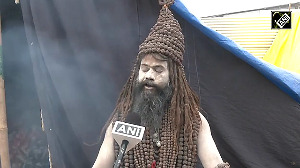For most people, tea is an integral part of a long day at work. The tea plant, botanically called Camellia sinensis, releases a flavour when combined with water that is soothing to some, invigorating to others.
If consumed in moderation, tea is a good health tonic. It is a versatile drink that can be prepared in various ways, depending on the climate, one's mood, and health. Make it mild, strong, brewed, boiled, hot or cold. During monsoons and winters, strong masala or ginger tea or light ginger-lemon tea does the trick. In summer, a tall glass of ice tea with a dash of mint leaves is refreshing. Here are some methods of preparing this interesting beverage.
Rujuta Barot, a dietician at a Mumbai-based medical institute, prefers strong kadak chai that she prepares with less milk and more water. She says, "Milky tea makes me lazy throughout the day." This is how she prepares her morning cuppa:
Kadak Chai
Method
Boil a cup of water, with a half teaspoon of green tea leaves. Add a small piece of ginger. Add sugar, as per your taste. Then add tea powder and a mashed elaichi (cardamom). Allow this black tea to boil thoroughly. Finally, add about 1/4 cup of milk and give it a final boil.
Delhi-based soccer coach Arup Das prefers light tea, with very little milk. He says, "I mainly drink tea during winter to soothe my throat from the pollution or when I'm unwell." Dr MK Munshi, senior executive director at a software firm in Mumbai, prefers green tea and brewed or liqueur tea. This is how he prepares it:
Brewed or liqueur tea
Method
Use a bone china teapot, not a metal kettle. First boil water and rinse the teapot with a little bit of the hot water. Add 1-2 spoons of green tea or normal tea leaves to the pot, depending on the number of cups to be served. Pour boiling water into the pot, cover it with a tea-cosy and allow the tea to brew for around 5 minutes. While brewing, you can also add a bit of lemongrass, tulsi or mint leaves to give it a different flavour and aroma. Serve with a pinch of sugar and a dash of lemon.
Using a bone china or glass kettle to brew tea is healthier as glass is chemically inert, and doesn't react to tannins present in the tea. Boiling tea in a metal kettle or pan can, in the long run, prove harmful as the tannins react with the metal.
There is a difference between brewed or liqueur tea and the usual boiled tea. For both, the ingredients, preparation and taste are completely different. For brewed or liqueur tea, use tea leaves and not tea powder. For example, Green Label Tea and Assam or Darjeeling teas are leaves. You have to allow the leaves to let out the flavour, colour and aroma while soaking in the hot water in a ceramic tea pot. These kinds of teas are lighter and can be made into lemon tea, ginger lemon tea. They and taste good without milk as well. The colour will be light gold and the aroma, refreshing.
However, for the usual boiled tea, one can use tea powder such as Brooke Bond Red Label or Taj Mahal. On boiling, the tea will turn black and, if you add milk, cardamom, cinnamon and ginger, you make the perfect kadak masala chai.
Pune-based Lekha Limbu, an instructional designer, prefers black tea. She feels milk in tea diverts a person's attention from the taste and flavour of the REAL tea. This is how she prepares her cup:
Black tea
Method
Boil a cup of water. Put half a teaspoon of tea leaves in a glass. Add a bit of the warm water to it. Cover the glass and set it aside. After five minutes, strain the black tea from the glass into a cup. Top it up with warm water and stir in the sugar. Limbu suggests, "If you're adding milk to Darjeeling Tea, warm it and add it along with the warm water for brewing. For CTC from Nilgiris/ Doars, boil water and milk together, then add tea leaves and sugar. When the colour of the tea looks fine to you, remove from the fire and strain.
Anuj Gemawat, a Bangalore-based hotelier, prefers teas that have a fragrant flavour. "The tea must be strong and refreshing," he says. "My teas must be boiled well and strong and I boil my tea directly with the milk. My favourites are Darjeeling and English Breakfast."
Ever wondered why the Chinese are so thin? That's because they drink a lot of green tea with their meals. "Tea can be healthy if consumed in moderation," says dietician, Samyukta Ganesh from Kochi. Green tea, especially, has therapeutic properties. It should ideally be consumed during your meals, as it is an excellent source of antioxidants that help your body retain nutrients from food. "Teas such as green, jasmine, lemongrass or lemon, help in digestion and controlling bad cholesterol," adds Ganesh. "But people suffering from gastro-intestinal diseases should avoid drinking tea as the caffeine content can aggravate their condition. Also, excessive tea drinking can lead to sleeplessness. Ideally, two cups a day is the right amount to be consumed."
There are a host of exotic range of teas available in the market. Most five-star hotels and restaurants offer a wide range. For instance, Cocoa Tree, a coffee shop at the four-star hotel Avenue Regent on MG Road, Ernakulam, Kochi, prepares its range of teas from Earl Grey and Assam with Tata Tetley tea bags. Infinitea, on Cunningham Road in Bangalore, is a storehouse on a wide variety of teas. The prices range between Rs 40 and Rs 500 per 100 grams, based on the quality, variety and rarity of the tea.
Other types of teas readily available in the market are Camomile, English Breakfast, Mint tea, Green Tea, Darjeeling, Sri Lankan, Mixed Tea, along with many artificial flavours and sweeteners. "Camomile, mint and green teas are best had when boiled in hot water and strained without adding milk and sugar, as this is the best way to savour them," says Gemawat.
The market is getting flooded with new flavoured teas that have artificial ingredients like chocolate and strawberry. Eventually, however, the real aroma and taste of tea may be lost in such pomposity.
Tea tips
1. Substitute teas from the vending machine by placing a tea bag in a cup of hot water. That way, you can keep the extra sugar and additives at bay.
2. Place a small airtight container with mint/ tulsi/ lemongrass leaves in your office drawer. Crush a few leaves and add it to this black tea.
3. Loads of tea drinking means lots of sugar intake; use low cal sweeteners instead.
4. To soothe a sore throat, add a pinch of black pepper to your tea.
5. For common cold and cough, add a teaspoon of honey and a few drops of lemon in liqueur tea. This will keep you warm.






 © 2025 Rediff.com -
© 2025 Rediff.com -